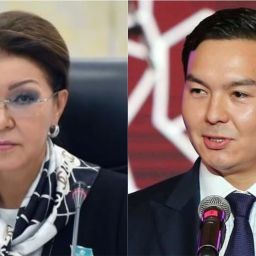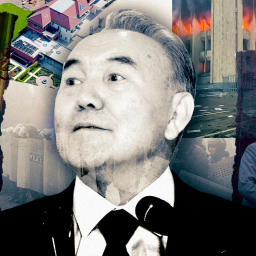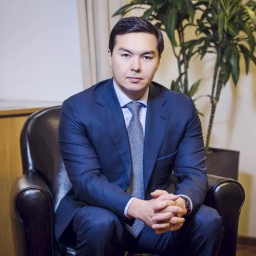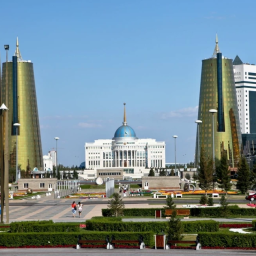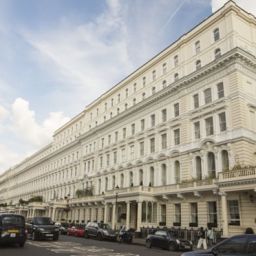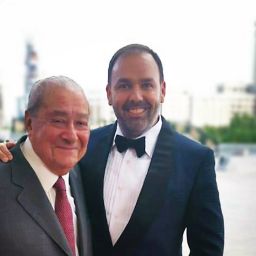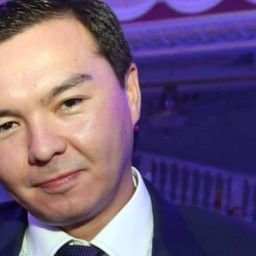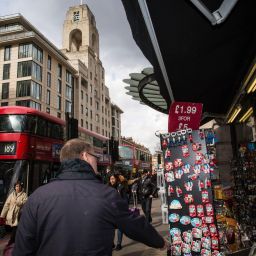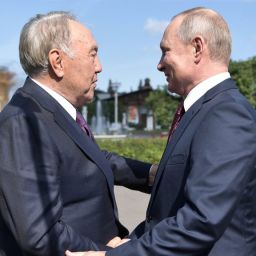
Dolfin Financial went bust after being accused of misleading regulators over its ties with Nurali Aliyev, an oligarch with luxury property in London
With The Daily Telegraph and openDemocracy.
The grandson of Kazakhstan’s autocratic former leader was the mystery client at the centre of the collapse of a City firm specialising in ‘golden visas’ for the super-rich, SourceMaterial and openDemocracy have learned.
Dolfin Financial went bust last year after the Financial Conduct Authority banned it from regulated activities saying it “dishonestly or recklessly provided misleading information” about its visa schemes and a relationship with an “ultra-high net worth client”.
The FCA did not name the client but openDemocracy and SourceMaterial have established that it was Nurali Aliyev, the favoured grandson of Nursultan Nazarbayev, Kazakhstan’s long-time “leader of the nation”.
In the first week of January, at least 225 people were killed in clashes between security forces and demonstrators against the Kazakhstani regime, whose leaders have become spectacularly rich from the country’s abundant oil, gas and metals. Much of that wealth is stored in London: a previous SourceMaterial investigation revealed that Aliyev’s mother, Dariga Nazarbayeva, was the secret owner of iconic properties in Baker Street worth £140 million.
“UK law is still riddled with loopholes that enable kleptocrats to come and go in the UK with impunity and stash their cash here”, said Susan Hawley, head of Spotlight on Corruption, a campaign group.
Dolfin’s evasions about its relationship with Aliyev, 37, are significant because foundations he owned had been subject to an Unexplained Wealth Order, popularly known as a ‘McMafia order’ after a BBC drama about Russian oligarchs. The measure requires an individual to account for the origin of their wealth, paving the way for authorities to seize assets if there is no legitimate source of cash.
The FCA said that Dolfin, which managed over £1 billion in clients’ assets, was not open with the watchdog about its connections and tried to cover its tracks after a journalist began asking about its relationship with a client served with a McMafia order.
At first Dolfin told the regulator that it had not dealt with the client—now identified as Aliyev—in the preceding year. In fact, there was a “significant amount of ongoing activity” between Dolfin and the client, his wife and their business interests, according to the FCA’s investigation.
Dolfin hired a “crisis management consultancy” to prevent it being publicly linked with Aliyev, while a staff member was instructed to scrub any references connecting them to the client from public registers, the FCA said.
Lawyers for Aliyev and Nazarbayeva succeeded in overturning the McMafia order at the High Court last year—though a SourceMaterial investigation later cast doubt on some of the evidence they presented to the court. The case was “a groundless and vicious legal action” Aliyev said at the time.
Dolfin specialises in securing UK investment visas for wealthy clients. The visas are intended to help attract entrepreneurs to Britain if they invest at least £2 million—but the FCA said that the company used a network of companies to engineer a system that allowed investors to contribute only £400,000.
There is widespread concern that these “golden visas” are open to abuse. In 2020 a parliamentary committee called for a review of the UK’s investment visa programme as part of a report into the threat of Russian interference in British politics.
Court papers reveal that in 2016 Aliyev—who at the age of 19 was head of Kazakhstan’s largest sugar producer and by 22 was running one of the country’s largest banks—applied for a golden visa using his address on The Bishops Avenue, the North London address dubbed “Billionaires’ Row”. The documents do not specify if he was successful or whether Dolfin facilitated the application.
Dolfin was founded in 2013 by Roman Joukovski, a British investment banker named in court papers as having previously acted as a financial adviser to Aliya Nazarbayeva, the youngest daughter of Nazarbayev.
Joukovski’s work for Aliyev goes back at least as far as 2014 when an entity controlled by the banker began managing a company through which the oligarch owned his £33 million Bishops Avenue property.
In a High Court claim Aliya Nazarbayeva, now 41, alleged that Joukovski and his business associates in 2007 created a complex offshore structure “in order to hide and protect” her fortune because she was a “politically exposed person”. The associates then used it to shift more than $300 million out of Kazakhstan, according to Nazarbayeva’s claim.
The purchases included another Bishops Avenue mansion and a private jet, according to the High Court claim which was lodged in 2016 but was settled earlier this month. In the suit, Nazarbayeva accused two of Joukovski’s associates of siphoning off her cash. The associates denied any wrongdoing and Joukovski himself was not a defendant.
In a letter to SourceMaterial and openDemocracy, Joukovski’s lawyers denied that he had ever provided Ms Nazarbayeva with “any financial or business advice”. Joukovski, who was not named in the published FCA notice on Dolfin, had “no material role” in the regulator’s investigation, the lawyers said.
Kazakhstan erupted into violence in early January when the government cracked down on peaceful rallies that were triggered by a fuel price hike but quickly expressed wider anger at an oligarchic regime under which it is estimated 162 people own 50 per cent of the nation’s wealth.
The country has been plagued by cronyism and corruption since independence from the Soviet Union in 1991. In 2003 James Giffen, an American businessman was charged with diverting $78 million in bribes from oil companies to the Kazakh government, and released after claiming he was working with the CIA at the time.
A 2019 investigation by SourceMaterial found that Glencore, a mining conglomerate, had effectively gifted the ownership of an exclusive private school and two goldmines to a billionaire friend of Nazarbayev. Glencore denies any wrongdoing.
The failure of Dolfin throws a spotlight on the UK’s golden visa scheme, which offers “red carpet” treatment for oligarchs seeking a haven for suspect money, according to Hawley of Spotlight on Corruption.
Half of all golden visas issued in the UK are now being reviewed by the Home Office. A government report into the programme was announced nearly four years ago but has yet to be published.
“It is essential that the government urgently publish their report and come clean about how they are going to stop the golden visa route rolling out the red carpet for kleptocrats,” Hawley said.
Aliyev and his representatives did not respond to requests for comment.
Picture by UNESCO/Nora Houguenade licensed under creative commons
Original source of article: https: https://www.source-material.org/
